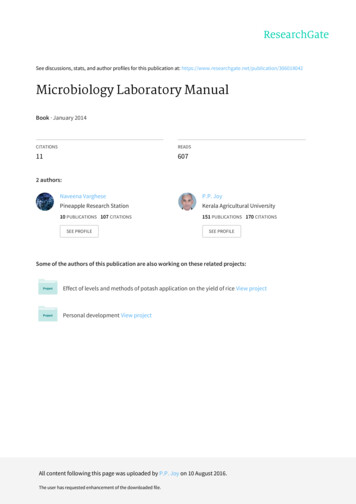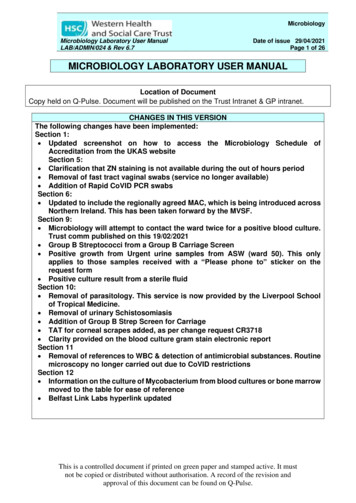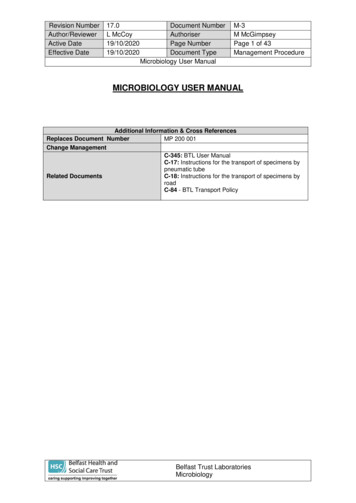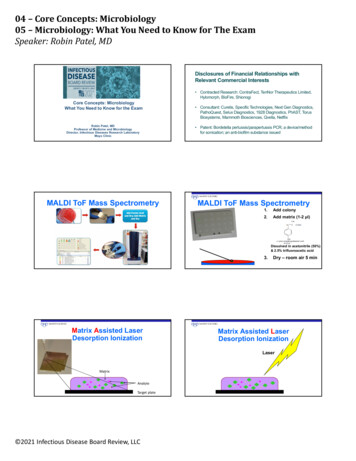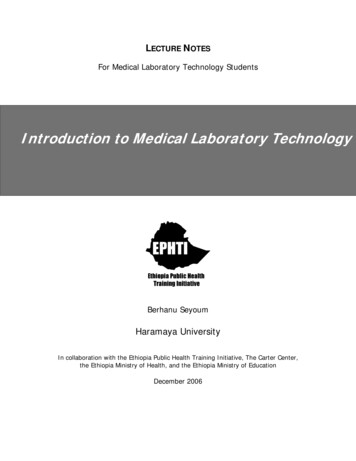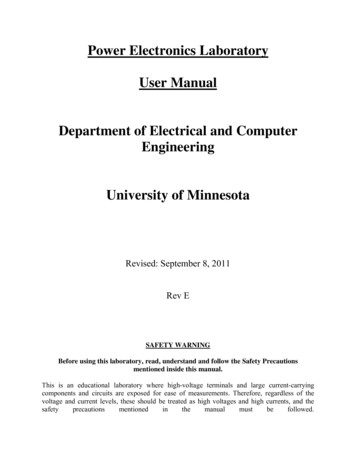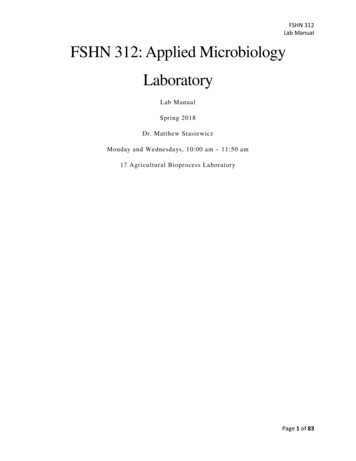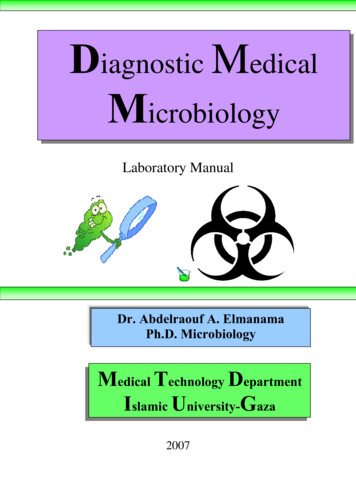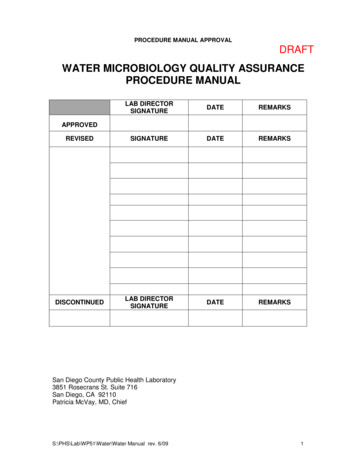
Transcription
Oxford University HospitalsNHS Foundation TrustUKAS No: 8639Department of MicrobiologyUser ManualISO 15189: 2012Clause 5.4MICROBIOLOGYDEPARTMENTLaboratory User ManualV5.2 Dec 2019Page 1 of 75
Oxford University HospitalsNHS Foundation TrustUKAS No: 8639Department of MicrobiologyUser ManualISO 15189: 2012Clause 5.4Table of ContentNumberi1.02.03.04.05.0SectionPageRevision History4INTRODUCTIONGENERAL INFORMATION2.1 Location2.2 Postal Address2.3 Hayes DX Address2.4 Laboratory Hours2.5 Contact Us – Core Laboratory Hours2.6 Contact Us – Outside Core Hours2.7 Contact Us – via email (non-urgent)2.8 Key ContactsQUALITY ASSURANCE3.1 Accreditation3.2 Providing Feedback3.3 Complaints and Compliments3.4 Protection of Personal Information3.5 Service Continuity PlansREQUESTING TESTS & SAMPLE REQUIREMENTS4.1 Using EPR to request tests – for OUH Staff4.2 Using SunquestICE to request tests – for Primary Care / GPs4.3 Request Form and Sample Labelling4.4 Patient Collected Samples4.5 Patient Consent4.6 Specimen Containers and Sample Collection4.7 High Risk Samples4.8 Requesting Additional Tests4.9 Specimen Transport4.10 Requesting Urgent Tests4.11 Rejected Samples4.12 How to order more containers4.13 Tests not routinely performedRESULTS5.1 Reporting of Routine results (Including Reference LaboratoryResults)5.2 Alerts Regarding URGENT 1222223232323Page 2 of 75
Oxford University HospitalsNHS Foundation TrustUKAS No: 86396.07.0Department of MicrobiologyUser ManualISO 15189: 2012Clause 5.45.3 Clinical Advice5.4 Antibiotic and Anti-fungal assays5.5 Needle Stick Injuries5.6 Access to Specific ImmunoglobulinsINVESTIGATIONS, TURNAROUND TIMES, SAMPLEREQUIREMENTS6.1 Spurious Results6.2 Test repertoire6.3 Referred Tests6.4 Turnaround TimesAppendices7.1 Appendix 1: Blood Sample Containers and Order of Draw7.2 Appendix 2: Other Sample Containers7.3 Appendix 3: Antibiotic and Anti-fungal assays.7.4 Appendix 4: Microbiological Specimens Types7.5 Appendix 5: Guide to Microbiological Investigations.7.6 Appendix 6: Laboratory Repertoire7.7 Appendix 7: Referred Examinations7.8 Appendix 8 Actual Laboratory Turnaround Times242424252525272727282930333646566067Page 3 of 75
Oxford University HospitalsNHS Foundation TrustUKAS No: 8639Department of MicrobiologyUser ManualISO 15189: 2012Clause 5.4(i) REVISION HISTORYVersion4.14.24.34.44.54.65.05.1Revision HistoryDescription of ChangeReformat / Rewrite / UpdateRemoval of non-functioning Web LinksAddition of Zika testingClinical Document ReviewInclusion of Revision History / Reformat9.0 APPENDIX 1 Removal of 7mg/KgGentamicinUKAS Finding - 3.4: Addition of HortonTransport timesUKAS Finding – Aims and remit UKASAccreditationWeb Links - UpdatedUKAS Finding - Appendix 3 – Hepatitis Eadvice & PHE SMI V 53 updateAppendices 4 & 5 UpdatedReformat and addition of pre-analysisstorage times in Appendix 3Whole Document Review and ReformatAmendments to 7.4 to include minimumsample volume required (UKAS finding).Amendment to 4.6 on correct disposal ofmaterials at sample collection (Internalaudit finding).Addition of OCP TATs (Section 7.8) (Internalaudit finding).Addition of 3.5 Service Continuity SectionAuthorEffective DateKJ & PM09/08/2016RPK & MA19/07/2017RS & RPK01/11/2017SO & RPK12/11/2018MA, LB & RPK17/12/2018SO & MA14/01/2019SO, AJ, MA,RPK25 Oct 2019SO, AJ, MM,CT, LL, EJ, SM12 Dec 2019Page 4 of 75
Oxford University HospitalsNHS Foundation TrustUKAS No: 8639Department of MicrobiologyUser ManualISO 15189: 2012Clause 5.41.0 INTRODUCTIONThis document aims to provide users with clear information about how users can access ourservices within Oxford University Hospitals NHS Foundation Trust.The document is structured to reflect the flow of a sample, from the point-of-care through toprovision of results and clinical advice.This is a controlled document. Please visit www.ouh.nhs.uk/microbiology/default.aspx for thelatest version as well as other useful links and information.2.0 GENERAL INFORMATIONMicrobiology is part of the Oxford University Hospitals and based at the John Radcliffe Hospital,Oxford. We examine over 638,000 samples per year for the presence of bacteria, viruses, fungiand parasites which may cause a range of diseases from meningitis to urine infections, andwork with specialists in infectious diseases and public health, advising on the best use ofantibiotics both in hospitals and the community.For external organisations ordering tests from us: please note that, by sending us a sample andcompleted request form, you will be entering into an agreement based on Laboratory MedicineTerms & Conditions (see www.ouh.nhs.uk/microbiology/default.aspx)For information regarding private patient testing, please contactmicrobiology.admin@ouh.nhs.ukThe Microbiology Departments values are:Excellence Compassion Diagnostic Stewardship Innovation Education ProfessionalismSee Section 4.13 on Diagnostic Stewardship2.1 LocationThe Microbiology Department is situated at the John Radcliffe Hospital, in the main building. From the main entrance on Level 2 of the John Radcliffe Hospital, walk down thecorridor and take the central lifts to either Level 6 or Level 7.On leaving the lift look for the Microbiology sign (on the corridor that has nowards).Walk to the end of this corridor, where there is a hatch.Please ring the bell and someone will assist you.Page 5 of 75
Oxford University HospitalsNHS Foundation TrustUKAS No: 8639Department of MicrobiologyUser ManualISO 15189: 2012Clause 5.42.2 Postal AddressOxford University Hospitals NHS Foundation TrustDepartment of MicrobiologyLevel 6/7John Radcliffe HospitalHeadley WayHeadingtonOxfordOX3 9DU2.3 Hayes DX AddressDX 6540700HEADINGTON 93 OX2.4 Laboratory HoursThe Laboratory is open 24/7 365 days a year.CORE HOURSMonday - FridaySaturdaySunday08:30 – 17:0008:30 – 17:0008:30 – 17:00During these times the laboratory telephones are fully manned and we will be able to respondto most requests.LABORATORY OPERATIONAL HOURSMonday - Friday08:30 – 22:00Saturday / Sunday / Bank Holidays 08:30 – 22:00LABORATORY OUT-OF-HOURSMonday – Sunday22:00 – 08:30NOTESpecimens will be received in the laboratory at all hours, including overnight and weekends.Page 6 of 75
Oxford University HospitalsNHS Foundation TrustUKAS No: 8639Department of MicrobiologyUser ManualISO 15189: 2012Clause 5.42.5 Contact us – CORE Laboratory HoursGeneral enquiries (Healthcare professionals only): 44 (0) 1865 221918For clinical advice, please try to contact the correct team overseeing care of patients in yourclinical area.Clinical enquiries (Healthcare professionals only): 44 (0) 300 304 7777 bleep 4077Microbiology LaboratoryPoint of contactRESULTSUrgent requests (daytime)Medical staff (Microbiologyadvice including advice toPrimary Care)Clinical advice/consultation onthe John Radcliffe site andWomen’s CentreClinical advice/consultation onthe West Wing/TraumaClinical advice/consultation onthe Churchill siteClinical advice/consultationfor ChildrenClinical advice/consultation onthe Horton siteClinical advice/consultation onthe NOC siteNeedle sticks/splash exposureincidentsLaboratoryTelephoneBleepAvailable on EPR or GPsystems. In the event of EPRdowntime results should beavailable on OUH Case notes 44 (0) 1865221918Microbiology SpR 44 (0) 1865220880Microbiology SpR 44 (0) 300 3047777Microbiology SpRMicrobiology SpRPediatric ID SpRContact ID SpRContact ID SpRDaytimeFor staff: call occupationalhealth.Non-staff and out of hoursadvice: contact microbiologySpR via JR switchboard.40774076 44 (0) 300 30440757777 44 (0) 300 30450397777 44 (0) 300 30443747777 44 (0) 300 30497997777 44 (0) 300 30471867777OUH: 44 (0) 1865 223325Mental Healthcare Trust: 44 (0) 1865 223370Primary Care, Nursing Homesand Community Hospitals: 44 (0) 1865 223370Oxford University: 44 (0) 1865 282678Page 7 of 75
Oxford University HospitalsNHS Foundation TrustUKAS No: 8639Department of MicrobiologyUser ManualISO 15189: 2012Clause 5.4Infection Control Team(9am-5pm Monday-Friday)*TelephoneBleepJohn Radcliffe Hospital01865 2221921747Churchill Hospital01865 2255464124Horton Hospital01865 2290339797* Outside these times, please contact the Microbiology registrar on call via switchboard forurgent infection control advice2.6 Contact us – Outside Core Laboratory HoursMicrobiology LaboratoryOn-call clinical advice, needlestick and infection controladviceUrgent requests (Out-ofHours)Point of contactTelephoneMicrobiology SpR, via JRswitchboard 44 (0) 300 3047777Biomedical scientist, via JRswitchboard 44 (0) 300 3047777Bleep2.7 Contact by Email GP’s and primary care providers can contact the microbiology department for nonurgent advice via email, at microbiology.advice.OUH@nhs.netPlease note confidential patient information should only be sent from nhs.net accounts For administration / general enquiries only (not results), please email the department atmicrobiology.admin@ouh.nhs.uk We aim to provide a response within 2 working daysPage 8 of 75
Oxford University HospitalsNHS Foundation TrustUKAS No: 8639Department of MicrobiologyUser ManualISO 15189: 2012Clause 5.42.8 Key ContactsTelephoneDr MoniqueAnderssonDr LucindaBarrettDr Katie JefferyDr BridgetAtkinsProf DerrickCrookDr AndrewBrentDr Ivo ElliottToni MackaySarah OakleyRichard KirtonGeraldJesuthasanMicrobiologyClinical LeadDeputy ClinicalLeadDirector ofInfectionPrevention thology ology ITCoordinator 44 (0) 1865225303 44 (0) 300304 7777 44 (0) 1865220881/6 44 (0) 300304 7777 44 (0) 300304 7777 44 (0) 300304 7777 44 (0) 300304 uk14721329405613584129toni.mackay@ouh.nhs.uk 44 (0) 1865228349 44 (0) 1865220858 44 (0) 1865220871 44 (0) h.nhs.ukgerald.Jesuthasan@ouh.nhs.ukPage 9 of 75
Oxford University HospitalsNHS Foundation TrustUKAS No: 8639Department of MicrobiologyUser ManualISO 15189: 2012Clause 5.43.0 QUALITY ASSURANCEThe department strives to deliver a service that meets the expectations of our users at all times.Essential to this process is the establishing the needs and requirements of our users plusreviewing and monitoring these on a regular basis.3.1 AccreditationThe Microbiology department is accredited to ISO15189:2012, customer number 8639. Thescope of the accreditation can be found on the UKAS website.https://www.ukas.com/The department is continuously updating the repertoire of tests available and this may be thereason some tests may not be included in our scope on the UKAS schedule. All tests arevalidated or verified and conform to the departments quality management system prior tobeing available for use. Those examinations which are currently outside of our accredited scopeand part of a UKAS ‘Extension to Scope’ will be indicated on the laboratory report’If you require any further details on any aspect of the department’s quality management,please contact the Quality Manager.3.2 Providing FeedbackThe department strives to deliver a service that meets the expectations of our users at all times.Essential to this process is the establishing the needs and requirements of our users plusreviewing and monitoring these on a regular basis.Any suggestions for improvement can be sent via email to the Microbiology Clinical Lead,Laboratory Manager or Quality Manager (see section 2.8)3.3 Complaints and ComplimentsWe aim to be constantly looking for opportunities to improve and update our service, and tolearn from experience. On these grounds, please get in touch and let us know if you have hadany problems in working with the microbiology laboratory.Complaints, errors, mistakes and near misses within the laboratory are logged as nonconformity reports; a senior member of laboratory staff handles each of these in order tooptimize the process in future.Page 10 of 75
Oxford University HospitalsNHS Foundation TrustUKAS No: 8639Department of MicrobiologyUser ManualISO 15189: 2012Clause 5.4Informal complaints or comments can be made to Dr Monique Andersson(monique.andersson@ouh.nhs.uk) or via the Sarah Oakley (sarah.oakley@ouh.nhs.uk).Formal written complaints from patients, doctors and service users should be directed to one ofthe departments below. The web link provides information and guidance on the procedure, aswell as other supportive information.Patient Advice and Liaison Service k/pals.aspxOUH dback/complaints.aspxWe also like to receive compliments, so if you would like to feedback what we do well, pleaseuse any of the emails listed in section 2.7 or 2.8.3.4 Protection of Personal InformationThe department complies with the requirements of the Data Protection Act and CaldicottPrinciples on safeguarding patient confidentiality and information.All OUH staff undergoes statutory and mandatory training in clinical governance and dataprotection.Access to the laboratory computer system is password controlled and data is held inaccordance with OUH policy on data protection, following the rules set by the Data ProtectionAct (1998).Results from the microbiology laboratory will only be disclosed to other relevant medical orhealthcare professionals providing direct patient care.Further details can be found at:https://www.ouh.nhs.uk/privacy/default.aspx3.5 Service Continuity PlansIn the event that the department is unable to deliver the required service, for example, due toequipment downtime or failure, we will endeavour to contact all relevant users if it impacts onour turnaround times. In line with NHS England and OUH requirements the department has atested service continuity plan in place.Page 11 of 75
Oxford University HospitalsNHS Foundation TrustUKAS No: 8639Department of MicrobiologyUser ManualISO 15189: 2012Clause 5.44.0 REQUESTING TESTS & SAMPLE REQUIREMENTSIt is essential that requests, forms or samples are completed correctly with the minimum of 3unique patient identifiers.I.II.III.Unique identification number e.g. hospital number or NHS numberSurname / ForenameDate of BirthSingle or two identifiers may be accepted as long as there is a unique identifier number e.g.GUM clinic numbers, Clinical Trial patients, Chlamydia Screening programme.4.1 Using EPR to request tests – for OUH StaffFor OUH patients the electronic patient record (EPR) must be used to request MicrobiologyLaboratory tests.There is information for OUH staff on the OUH intranet for EPR support and training, and forEPR downtime procedures.Ensure you make the request for the correct patient, and select the correct patient episode.This provides the lab with patient identification (NHS number, hospital number, name and dateof birth), patient location and consultant. Select 'Requests and Prescribing' option from menu on left-hand side of screen.Click on 'Add' to make a new request.Use MCS to search for types of culture request, PCR to search for molecular assays etc. type the type of sample or culture request into the 'Find' search box, e.g.o Blood culture MCSo Urine MCSo Wound swabo Pus / deep wound / fluid / abscess / aspirate MCSo Mycobacteria culture MCSo HCV Ab screeno CMV IgGo Surface swab MCS is the correct option for eye, ear, throat, ulcer and skin swabs.Click on the appropriate option that appears in the box below, and select 'Done' to addthe test.Provide appropriate clinical details, including:o brief clinical history and date of onseto risk factors for infection (e.g. immunocompromised, drugs, intravenous druguse)or Page 12 of 75
Oxford University HospitalsNHS Foundation TrustUKAS No: 8639Department of MicrobiologyUser ManualISO 15189: 2012Clause 5.4travel history, if relevantany prior, present, or planned antimicrobial therapy.Provide your bleep or contact number so that you can be contacted if there are anyproblems or significant positive results.Confirm the request by clicking 'Sign'.Label each sample with the label printed via EPR, but do not cover the bar code onblood culture bottles.oo 4.2 Using SunquestICE to request tests – for Primary Care / GPsFor patients in primary care in Oxfordshire, SunquestICE should be used to requestMicrobiology Laboratory tests electronically.Ensure the correct date and time of the sample collection is entered on the request.Incorrect specimen type, incorrect examination request or insufficiently labelled specimensmay cause delay.Please provide key clinical details as this will help the laboratory to ensure the mostappropriate tests are performed and alert us to urgent results. Select Requesting tab followed by New Request icon and Microbiology tabMicrobiology tests are listed in alphabetical order. Select search tab to perform a quicksearch.For antenatal panels select GP - Antenatal tabUser Manual can be found under Handbooks tabEnsure that the correct date and time of sample collection is entered on request andsamples labelled appropriately.4.3 Request Form and Sample LabellingONLY where electronic requesting is not available, there is a standard request card suitable forall specimens.Ensure this is filled in correctly, as this helps reduce data entry errors, speed up turnaroundtimes and ensure correct locations for reports and invoices.Request cards with NO LOCATION will not be processed. Samples will be held for a maximum of7 days.It is available to GPs from the OUH Haematology Laboratory: 44 (0) 1865 220336Page 13 of 75
Oxford University HospitalsNHS Foundation TrustUKAS No: 8639Department of MicrobiologyUser ManualISO 15189: 2012Clause 5.4Microbiology request cards are BLUE. It is important to use the correct one, so that samples aredirected to the correct laboratory. The NHS number and hospital number are used to linksamples to patients' records, so it is essential that this information is recorded on all requests.Ideally the request form should have ALL the following essential pieces of information:I.II.III.IV.V.VI.VII.VIII.Unique identification number e.g. hospital number or NHS numberSurname / ForenameDate of BirthGenderPatient location and destination for reportName of requesting consultant, GP or requesting practitionerInvestigation requiredDate and Time sample was collected4.4 Patient collected samplesPatients should not be asked to deliver their own samples to the Microbiology Laboratory.Outpatient samples should generally be delivered via the GP.In the event of a patient delivering their own sample, this should be received at the specimenreception hatch on Level 7. See directions section 2.1Patient Information Leaflets can be found at: lt.aspx4.5 Consent for testingIt is the responsibility of the requesting doctor to obtain appropriate informed consent for allinvestigations, including testing for blood-borne viruses.Page 14 of 75
Oxford University HospitalsNHS Foundation TrustUKAS No: 8639Department of MicrobiologyUser ManualISO 15189: 2012Clause 5.44.6 Specimen Containers and Sample Collection SAMPLE REQUIREMENTSSpecimen CollectionRefer to 7.4 Appendix 4: For guidelines for Sample Collection Specimens for bacterial culture, wherever possible, should be collected prior to the startof antibiotic treatmentActual pus or tissue samples are always preferable to swabsUse aseptic technique during specimen collection to avoid unintentional contaminationSpecimens must be collected into sterile containersEnsure the correct specimen container is used for the sample type. Refer to 7.4Appendix 4Specimens must be clearly labelledAfter collection, ensure specimen container lid is secure and place in a plastic, sealablebagIt is the responsibility of the person collecting the specimen to ensure that it correctlylabelled and safe for transport to the laboratoryAll material used in the collection of specimens should be appropriately and safelydiscarded. Clinical waste (including gloves and disposable PPE) should be discarded intoorange bin bags or the appropriate clinical waste steam. Equipment that has been usedfor sample collection, and used point of care test cartridges, should be treated ashazardous waste and disposed of accordingly. Any equipment posing a sharps riskshould be disposed of into yellow sharps bins.Specimen containers should be clearly identifiable. Use a sticky label when available but do notcover any bar codes. Electronic requests will always generate a sticky label that must be usedfor these types of request.When making multiple electronic requests, make sure to put the correct label on each sample.Otherwise, the patient's full name and date of birth, NHS and/or hospital number should beclearly written.In order to accept samples for processing the laboratory requires a minimum of three uniquepatient identifiers on both the sample and the request. The only exception to this is for GUMsamples where two identifiers are accepted.Page 15 of 75
Oxford University HospitalsNHS Foundation TrustUKAS No: 8639Department of MicrobiologyUser ManualISO 15189: 2012Clause 5.4Specimen Acceptance Do not send samples in non-sterile containersSpecimens should be obtained prior to antimicrobial agents have been administeredAn adequate quantity of material should be obtained to ensure a full microbiologicalexaminationActual pus or tissue samples are always preferable to swabsAll specimens (other than blood cultures) should be stored at 2-8 C if immediatetransportation to the laboratory is not possibleBlood cultures should be transported immediately, but if delayed keep at roomtemperatureBlood Specimen TubesSee 7.1 Appendix 1: Correct tube and Order of Draw for collecting Blood Samples or laboratory-medicine/documents/tubeguide.pdf The vacutainer system is used in the Oxford University Hospitals.Please aim to fill specimen tubes completely.Paediatric bottles are available for collecting smaller volume samples from children,including blood cultures (single bottle instead of two). Never pour blood from one specimen container to another because transfer ofinappropriate additives will cause misleading results.If you have any queries please contact the appropriate department before collection. Other Types of SamplesSee 7.2 Appendixes 2: Actual pus or tissue samples are always preferable to swabsSwabs with bacterial transport mediumSwabs with virus/universal transport mediumSwabs for genital sampling (principally Chlamydia / Gonorrhoea / Trichomonas) –specialist swabs supplied by Becton Dickinson are required for use on their analyticalplatformUniversal containers (for CSF, urine, respiratory samples, stool, pus, tissues, fluids,prosthetic device samples etc.)Page 16 of 75
Oxford University HospitalsNHS Foundation TrustUKAS No: 8639Department of MicrobiologyUser ManualISO 15189: 2012Clause 5.44.7 High Risk SamplesWhat is a high-risk specimen?A high-risk specimen is one from a patient known to have been infected with: hepatitis B or C virus human immunodeficiency virus (HIV) HTLV-1 Creutzfeldt-Jacob disease (CJD) viral haemorrhagic fever (e.g. Ebola) other hazardous pathogens such as TB, typhoid or Brucella. Note: MRSA colonisation / infection is not high risk.Or a specimen from a patient suspected to have: Creutzfeldt-Jacob disease (CJD) viral haemorrhagic fever (e.g. Ebola) blood-borne virus infection (Hepatitis B / Hepatitis C / HIV) other hazardous pathogens such as TB, typhoid or Brucella but not MRSA.This includes all febrile travellers returning from areas high risk for typhoid and Brucella.For this reason, blood cultures received from the Infectious Diseases Ward are all processed ashigh-risk.Why is it important to identify high-risk specimens?It is important to identify high-risk specimens because extra precautions are needed; thesespecimens may pose an additional risk to ward staff, porters and laboratory staff.How should high-risk specimens be handled? Each specimen must be labelled ‘DANGER of INFECTION’ and sealed in its own separateplastic bag.The request card or tab at the top of the specimen bag should also state‘DANGER of INFECTION’. The request card should not be sealed in the same bag pocket asthe specimen.Page 17 of 75
Oxford University HospitalsNHS Foundation TrustUKAS No: 8639Department of MicrobiologyUser ManualISO 15189: 2012Clause 5.4What precautions should be taken for a patient with risk factors for viral hemorrhagic fever? If viral hemorrhagic fever (e.g. Ebola) is suspected, the case should be URGENTLYdiscussed with the Infectious Diseases consultant on call (via switchboard) or InfectiousDiseases SpR on bleep 5039 (during working hours) or via switchboard (out of hours).Samples from these patients require individual packaging and transportation based on arisk assessment that will be made on a case-by-case basis by the Infectious Diseasesteam in collaboration with the microbiology laboratory and Public Health England. These teams should only handle samples.If in doubt about risk status, please discuss with the laboratory first.4.8 Requesting Additional Tests To request additional tests on samples already received in the laboratory, please telephone(01865 2)21918 or liaise with the microbiology lab registrar (bleep 4077). The timeframe within which additional tests can be added depends on the nature of thesample. Urine 2 daysStool 7 daysPus samples 7 days Respiratory samples 7 daysCSF samples are stored for a minimum of 2 weeksSerum samples are stored for a minimum of 2 months.Virology molecular assays are stored for a minimum of 2 months.Prosthetic device sample 7 daysSignificant blood culture isolates are frozen, and can be tested further if required.4.9 Specimen TransportRefer to tory-medicine/default.aspxThe most efficient way to transport specimens including blood cultures is through the hospitalpod system.Samples are collected once or twice a day from GP surgeries, and delivered to central specimenreception on Level 4 of the John Radcliffe Hospital. They are sorted and delivered to variouslaboratories including Microbiology.Page 18 of 75
Oxford University HospitalsNHS Foundation TrustUKAS No: 8639Department of MicrobiologyUser ManualISO 15189: 2012Clause 5.4With transportation of Microbiology samples, care must be taken to ensure that the risk toothers is kept to a minimumCorrect details on specimen container / requestContainer is NOT overfilled, is leak-proof and securely tightenedThere should be no trace of any body fluids on outside of container. If insufficient sample totransfer to another container then thoroughly disinfect the outsideSpecimens must be transported individually within a plastic, sealable bagStoring Samples Prior to Transport To The LaboratorySpecimens should be transported as soon as possible to the laboratory after being obtained.Most specimens for testing within the microbiology laboratory must be processed within 24hours of being taken (maximum 48 hours).Urgent or critical samples must be processed without delayThe laboratory is able to receive routine samples 24 hours a day, including weekends. If specimen transport will be delayed, e.g. from primary care, specimens should bestored in a refrigerator (2-8 C) until transported to the laboratory.The exception to this is blood cultures, which should be kept at room temperature.Do not freeze specimens.Transport of Samples Within The John Radcliffe HospitalAll specimens should be sent to the laboratories in the large plastic bags provided, markedLABORATORY SPECIMENS, JOHN RADCLIFFE HOSPITAL.POD SYSTEM:The recommended way to transport samples (including blood cultures) is via the ‘POD’ systemavailable in high throughput clinical areas. ALL laboratory medicine specimens are suitable fortransportation using the POD system as long as they fit within the POD carrier. This works 24hours a day.On the John Radcliffe site the POD system ‘address’ for Microbiology Reception is code777.Page 19 of 75
Oxford University HospitalsNHS Foundation TrustUKAS No: 8639Department of MicrobiologyUser ManualISO 15189: 2012Clause 5.4SELF-DELIVERY:On the John Radcliffe site, you can deliver the samples to specimen reception (level 7) yourself– this may be quickest for urgent samples if you are within the John Radcliffe Hospital.BY PORTER:If using a porter, specimens from all areas should be clearly marked ‘URGENT – FORMICROBIOLOGY JR LEVEL 7 Specimen Reception’.Transport of Samples From NOC / Churchill / Horton HospitalsTransfer from other medical units in Oxford is by vehicles operated by the South CentralAmbulance Services (SCAS) and a shuttle van between JRH, Churchill Hospitals and NOC sites.This operates on an hourly basis.Transfer from the Horton General Hospital is by vehicles operated by SCAS and approvedsample courier services. Samples are collected from the Pathology Laboratory and should arrive15 minutes prior to SCAS collection time. The collection times are:Monday - Friday: 08:00; 11:00; 14:00; 16:30; 18:30; 22:00Saturday: 09:00; 11:00; 16:00; 23:00Sunday: 09:00; 12:00; 15:00; 23:00Specimens for urgent investigation out of core hours should be sent via the best availabletransport or porter service directly to the Joint Specimen Reception area on Level 4 at the JohnRadcliffe or to the Horton Pathology laboratories. From the Horton, urgent specimens shouldbe taken to Pathology Reception and the biochemistry on call BMS notified immediately. Theywill arrange transport of the specimen to Oxford.Transport of Samples From General Practice / CommunityOne – three times a day service (depending on practice size) to local G.P's operates for thecollection of specimens and to deliver reports and equipment for specimen collection at theJR2.All specimens that are transported by these ser
Oxford University Hospitals Department of Microbiology User Manual NHS Foundation Trust ISO 15189: 2012 UKAS No: 8639 Clause 5.4 Page 3 of 75 5.3 Clinical Advice 24 5.4 Antibiotic and Anti-fungal assays 24 5.5 Needle Stick Injuries 24 5.6 Access to Specific Immuno

